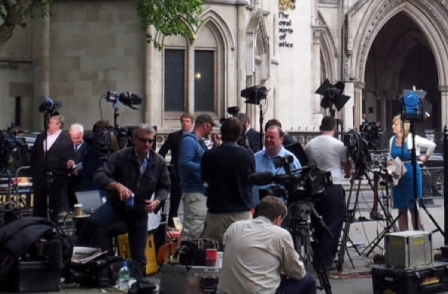
This week could prove a landmark moment in the battle to get cameras into courts across England and Wales.
With the Court of Appeal set to open to broadcasters in October, a Government source said that the Ministry of Justice is working with the judiciary and broadcasters to get cameras into crown courts as well. Previously, the judiciary had said it would consider this after trialling the system in the Court of Appeal.
Elsewhere in the UK, Channel 4 is to broadcast a documentary tonight on the retrial in a Scottish court of Nat Fraser. He was convicted for murder in 2003 after his wife went missing in 1998.
The two-hour film, The Murder Trial, will be broadcast at 9pm. The film does not represent the first time a trial in Scotland has been broadcast, but Channel 4 believes it will be the most in-depth.
The BBC broadcast a murder trial in Scotland in 1994, but that case ran over two days compared with Fraser’s five weeks and few witnesses consented to be recorded.
In this case, Channel 4 was given permission by the judge to record the trial and sought consent from witnesses to be broadcast afterwards. All but one witness approached by the documentary (there were 70 witnesses in all, but not all were asked) agreed that their evidence could be seen.
The film featured several witnesses taking the stand and was accompanied by interviews with friends and family, as well as the judge and legal representatives.
The Scottish judiciary was given the opportunity to watch the film before broadcast, but did not have a veto.
At a pre-screening, Channel 4’s deputy head of factual Nick Mirsky indicated that the plan was for the format to be repeated.
“I would hope that people involved and people in the legal profession would see this film and feel reassured by how responsibly it’s made, how thoughtfully, and the degree of sensitivity towards the family involved,” he said.
“At Channel 4, would we be interested in making more films in this territory? Yes. Do we feel that justice should be open? Yes.”
In attendance was Sky News associate editor Simon Bucks, who has been campaigning for cameras to be allowed into courts in England and Wales since 2002.
Speaking to Press Gazette afterwards, he praised the film, but pointed out that he has been campaigning for something different – the right to be able to broadcast near-live court coverage, not an in-depth documentary made over a number of months.
“The problem is, if that’s all you can do, you have to wait until the end of the case,” he said. “That, to me, makes it not a useful platform for news reporting.”
Asked why he has spent 11 years campaigning to get cameras into court, he said: “We think that the television is the way in which many people get access to news information. It’s the predominant medium.
"And it does seem to be very odd that in 2013 we are free to walk into a court anywhere but you cannot see something via television cameras.
“Open justice is only open in the sense that you have the geography or the time to witness the case.”
He added that what he thought the documentary did, and what television cameras in court could do, is educate people on how justice and court procedures work.
Sky News along with the BBC, Press Association and ITN are in the process of appointing one television court reporter between them, who will control four cameras in court, ready for October.
Email pged@pressgazette.co.uk to point out mistakes, provide story tips or send in a letter for publication on our "Letters Page" blog
